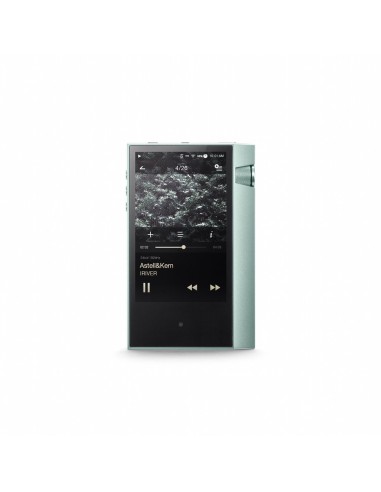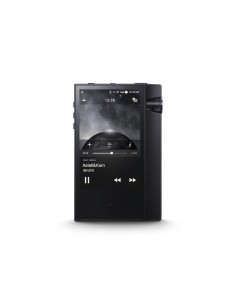AK70
Music player
The AK70's DAC, based on market-proven CS4398 chips of Cirrus Logic, has been used for years in Hi-Fi audios and the second-generation Astell&Kern devices.
The AK70 plays back 24bit 192kHz signals into bit-to-bit type.
32bit audio is downsampled using a sample-rate converter. In addition, DSD 64/128 can be played back through conversion to PCM.
* 32bit, 384kHz is downsampled to 24bit, 192kHz, and 32bit, 352kHz is downsampled to 24bit, 176kHz for playback.
* DSD 64/128 is converted via DSD-to-PCM to PCM 24bit, 176kHz for playback.
The AK70 supports the 2.5-mm 4-pole balanced output (2.3 Vrms) that has been in use since the second generation of the Astell&Kern players.
Unlike the unbalanced type, the balanced output type is capable of removing noise (common mode noise) that can occur in “signal + inverting ampli
fier signal” and has the strength of increasing output due to its double transmitting signals.
The AK70 can be used with a variety of balanced earphones and headphones made for Astell&Kern. It can also support the 3.5-mm 3-pole unbalanced output (2.3 Vrms), with compatibility with a variety of Hi-Fi earphones and headphones.
The AK70 supports USB audio digital out, first among Astell&Kern devices.
You can connect diverse digital-input portable amps through USB to the AK70. The AK70 can transfer DSD in native through DoP. It can also convert DSD into PCM for output for portable amps that do not support DoP.
* USB audio output is available only when digital input is possible through USB.
* DoP (DSD over PCM) : This is a standard for transferring DSD data to USB interface. This standard sends DSD data by mounting them onto PCM data frames.
* In order to link the AK70 with a portable amp, one needs OTG cable, which is not included in the AK70 package.
* The cable connecting OTG cable with a portable amp differs depending on the specs of the amp, >which is not included in the AK70 package.
The AK70 can be used with a USB DAC that can double as an embedded sound card by connecting with a PC/Mac through the USB port.
In the case of using the PC's embedded sound card, one may have to go through a complicated process to play back DSD data. In contrast, the AK70 can do so simply by connecting with the PC.
In the case of using the AK70 as a USB DAC, it can support up to 24-bit 96 kHz bit to bit, providing much richer sound through superior ambience and resolution way beyond the limits of an embedded sound card.
* When using the AK70 as a USB DAC, its PEQ settings are not applied, and output up to 24bit, 96kHz is supported.
* DSD 64/128 is converted via DSD-to-PCM for playback.
The AK70 can allow users to rip CDs with ease by linking with the AK CD-RIPPER.
By inheriting from the AK500N, it supports the CD track error correction feature and the meta data (ID3TAG) auto input feature using Gracenote's database without any change.
* The AK CD-RIPPER may not be properly recognized when using a power supply adapter rated at less than 5V 2A.
The AK70 comes equipped with the AK Connect feature that can be connected with network-ready Astell&Kern devices.
It is also appointed with wireless networking DLNA (Ver. 1.0), which makes it easy to work with NAS/PC on the same network and through an AK Connect app supporting smartphone/tablet computer.
DMP (Digital Media Player)
Finds a list of content on a media server for selection and playback.
DMC (Digital Media Controller)
Finds a list of content on a media server and establishes a connection to a playback-capable device (renderer). By default, a DMC establishes a connection between a media server and media renderer and controls content playback-related operations.
DMS (Digital Media Server = Network Server)
Actually stores the media content to be shared. When connected to a network, the DMS transmits/distributes the media content for other devices to stream or download.
DMR (Digital Media Renderer = Network Player)
Connects to a media server via media controller for content playback.







































